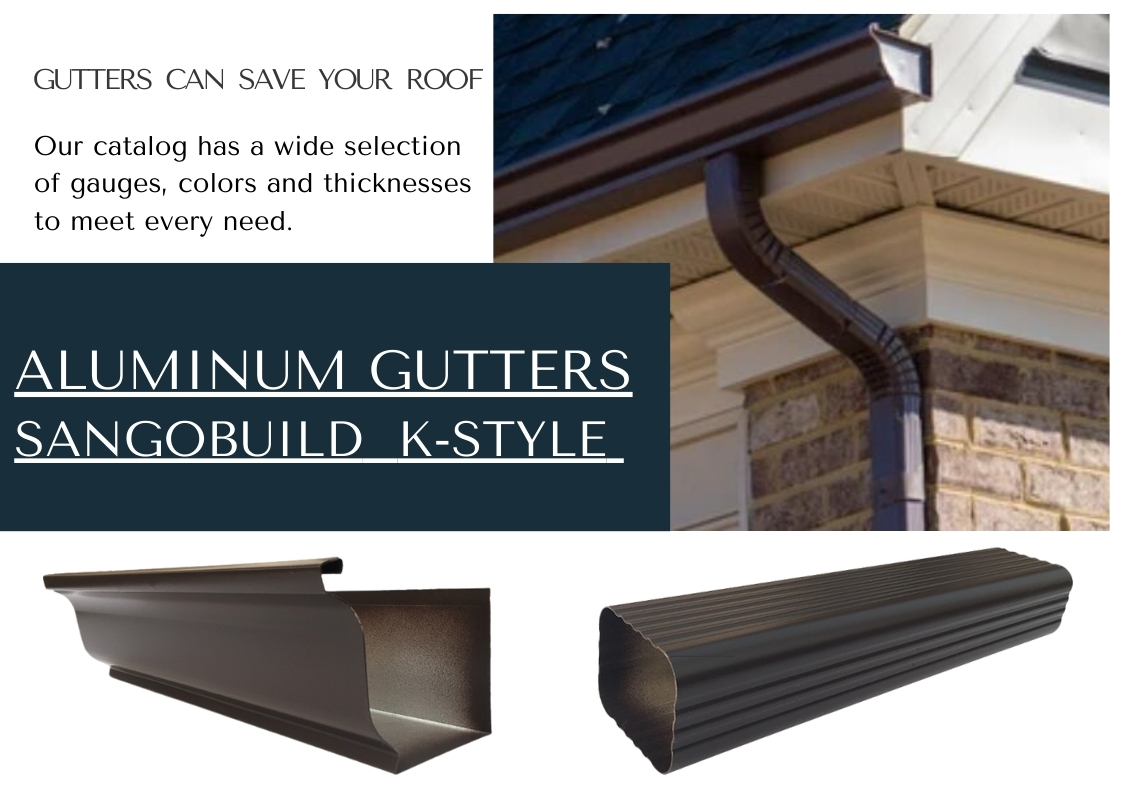THE LATEST IN ROOFING
If you need new gutters (or if your home is gutterless and you’re starting from scratch), you have a few important decisions ahead of you. Ultimately, the gutter material you select will depend largely on your budget, but you should also consider your home’s architectural style and your personal taste.
Most importantly, your new gutters must function correctly. Poorly installed gutter systems won’t direct water away from your home’s foundation, which can quickly translate to disaster. Major problems such as wood rot, foundation cracks, pest infestations, water damage, and soil erosion are all common occurrences when gutters don’t work the way they should.
Regardless of material, gutters are typically priced by foot. This price can vary according to the material’s thickness, otherwise known as the gauge, as well as the size and shape of the gutter.
Ready to learn everything there is to know about gutter materials? Let’s go!

1. Aluminum Gutters
Aluminum gutters are widely installed on homes today and with good reason. Their relatively low cost coupled with long-term strength makes them an ideal choice for many households. On average, aluminum gutters will last at least 20 years (and often longer) with consistent cleaning and maintenance.
Aluminum gutters are available in a variety of styles, sizes, and colors. While some aluminum gutters are installed in sections, many professionals will fashion seamless gutters on-site that are customized to your home’s specifications.
Advantages of aluminum gutters
You can choose seamless gutters to avoid seam sealant reapplication over the years.
Aluminum will not rust or thin over time.
Compared to other metal gutter options, aluminum is on the lower end of the cost spectrum.
Aluminum gutter installation is quick and straightforward.
You’ll have plenty of factory-applied color options to complement your home’s exterior.
If you’re looking for a low-maintenance, cost-effective gutter system with plenty of options for customization, ask your gutter installation contractor about aluminum gutters. Opt for thicker gauge metal to get the most bang for your buck, especially if you live in a part of the country that sees significant snowfall in the winter.
2. Copper Gutters
copper gutters on a stone house Copper gutters are widely hailed as a stunning architectural feature to add to a home. Copper is a high-end gutter material not only because of its aesthetic appeal but also because of its durability: copper is very strong, and when they’re properly maintained, copper gutters will likely never need replacement.
Like aluminum gutters, copper gutters can be installed in sections or in a seamless design. To help you determine whether copper is the right material for your gutters, let’s explore some of the pros of copper gutters:
Advantages of copper gutters
Copper is a high-end, very durable gutter material that will beautify and add value to a home.
Joints between sections are soldered during installation, which, along with consistent maintenance and cleaning, eliminates the need for periodic sealant application.
Copper gutters are typically available as a seamless option.
If you’re planning to put your house on the market soon or have made other recent renovations to bring your home’s value into line with the rest of your neighborhood, you may find that your return on investment for copper gutters will be lower than you’d hoped.
3. Steel Gutters
Black steel half-round gutters on the corner of house Steel gutters are known for their sturdiness and strength and are available in either a stainless or galvanized finish.
Stainless steel gutters are a relatively rare find, mostly due to their high costs. While they never rust and can maintain their sheen for years, the significant up-front investment can be a hard pill to swallow for many people.
Galvanized steel gutters are made from steel that has been coated with a thin layer of zinc, which strengthens the metal and makes it resistant to rust. Galvanized gutters typically last approximately two decades.
Advantages of galvanized steel gutters
Galvanized steel is resistant to rust and outperforms aluminum in terms of resisting damage and thermal warping.
Steel gutters can be installed in seamless runs.
Aluminum gutters, alternatively, are more susceptible to dents and bending but will never rust. Talking these options over with a gutter professional will help you choose the material that suits your home environment and needs best.
4. Vinyl Gutters
white vinyl gutters with gutter cover Vinyl gutters are made from PVC and come in a variety of colors. Because they’re a relatively low-cost option and are often marketed as a simple DIY solution.
Vinyl gutters typically last several decades and are a great choice for simple, easy-care home improvement. Protect your safety and the value of your home by having the pros take care of the installation.
Advantages of vinyl gutters
Vinyl is a plastic that will not rust or rot.
Vinyl gutters quietly redirect water in comparison to some metals that may create a more noticeable noise during rainstorms.
Ideal for budget-conscious homeowners.
You’re now equipped with the lowdown on gutter materials, but making the final decision takes time. When it comes time to select a gutter material, you’ll need to think about budget, of course, but also about what makes the most sense for the architectural style of your home and your area’s climate.
Regardless of the gutter material you decide is best for your home, work with a knowledgeable gutter professional to ensure that your gutters do their job instead of causing more problems.



REQUEST A QUOTE
Copyright © Hangzhou Singer Building Materials Co., Ltd. All Rights Reserved |
Sitemap
| Powered by 
SEOKeywords:Roof Tile ManufacturerRoof Shingle ManufacturerAsphalt Shingle SupplierRain Gutter CompanyShingle Roofing CompanyWaterproof Tape For RoofPressed Steel Roofing TilesRain Gutter SystemGray Asphalt ShingleStone Coated Metal Roofing Manufacturer